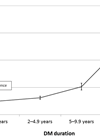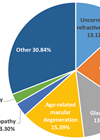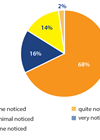Ophthalmology
A pituitary tumour from 1927
The author shares a clinical case from Edinburgh Royal Infirmary’s archives. It is not often in the course of a clinical career that one gets the opportunity to review a patient who had been treated by a pioneer neurosurgeon some...
Pituitary adenoma causing compression of the optic chiasm
A 21-year-old girl presented to her general practitioner (GP) with a three-month history of headaches, becoming more frequent and associated intermittent vomiting that did not improve with simple analgesics. There was a strong family history of migraines. She was initially...
Amnion-assisted conjunctival epithelial redirection (ACER): Enhancing stem cell transplantation treatment of total limbal stem cell deficiency
An exploration of Professor Harminder Dua’s recent work using a technique called amnion-assisted conjunctival epithelial redirection (ACER) to aid the success of conjunctival-limbal grafting procedures. ACER provides a refined way to use amniotic membrane (amnion), such as Omnigen® (NuVision® Biotherapies,...
Twenty-five years in retina
In the next of our articles celebrating 25 years of Eye News, the authors look at how the retina specialty has changed over this time and ask what the future might hold. Retinal disease management has benefited from great advances...
Advances and developments in medical retina
The author provides an update on late breaking clinical trial results in neovascular age-related macular degeneration (nAMD) and presentations on diabetes management from the American Academy of Ophthalmology Retina Subspecialty Day, held during the Academy’s annual meeting in Chicago, October...
Paediatric ptosis
Manoj Parulekar and colleagues provide a comprehensive overview of the diagnosis, assessment and management of childhood ptosis. Blepharoptosis (commonly referred to as ptosis – Greek, πτῶσις, ‘to fall’) is a condition where the upper eyelid is in an abnormally low...
Eye disease patients have more opportunity than ever to take part in NHS research studies
A new report highlights how 76% of UK hospitals now offer patients the opportunity to take part in studies of eye disease to improve research and innovation. ‘Ophthalmology research in the UK’s National Health Service: the structure and performance of...
Rare eye diseases: progress continues with authorised orphan medicines and breakthrough technologies
An update on the development of orphan medicines, recent regulatory treatment approvals for rare eye conditions and advances in retinal prosthetic technologies for blinding diseases. The prevalence of a rare disease is based usually on a range of estimates and...
Cataract incidence rates in patients from the UK suffering with diabetes mellitus
The authors summarise the main findings from a recent study which investigated the incidence rates of cataract in patients with or without diabetes mellitus (DM). Background to the study Worldwide, the World Health Organization (WHO) estimates that 253 million people...
A short survey of the views of clinicians on the role of procedure-specific consent forms
Informed consent is an ethical and legal right of every patient [1]. It is essential that patients receive clear, concise and accurate information regarding the risks, benefits and alternatives to a potential intervention. In addition to this, the patient must...
Fight for Sight to maximise impact by funding solutions-focused research in priority eye conditions
Fight for Sight aims to stop sight loss by funding pioneering research. Rod McNeil takes a look at the Primer Fellowship Awards programme, which provides funding for up to £60,000 for individuals to undertake vision-related research for one year. Among...
Introduction of the Mydriasert insert at the Manchester Royal Eye Hospital
The authors report on a study to examine the effects of the Mydriasert insert on time, effects, patient comfort and tolerability at Manchester Royal Eye Hospital. Mydriasert is an insoluble ophthalmic insert indicated for mydriasis prior to ophthalmic surgery, which...















